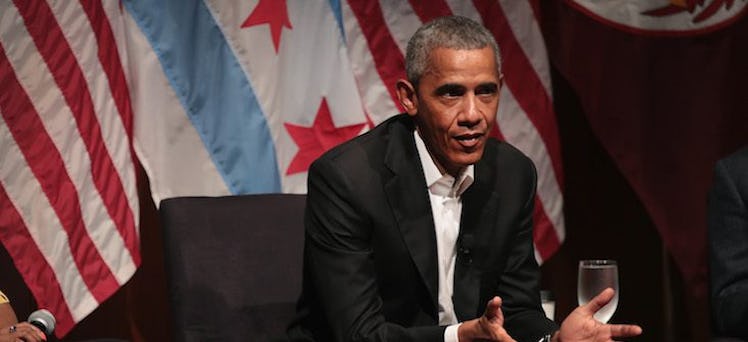
Obama Says To Get Off Your Phone In First Post-Presidency Appearance
Former President Barack Obama made his first public appearance since leaving office on Monday.
He joined a group of young leaders for a forum on civic engagement at the University of Chicago.
They covered a wide arrange of topics from voter participation to running for office. But the former president made a particularly interesting point about the cons of how young people obtain their news and other info.
He said,
A lot of us who have been in politics for awhile, do see a change from 20 years ago, certainly 30 years ago, where it used to be everybody...had the same information... We had different opinions about it, but there were a common baseline of facts.
Obama posited that the internet "accelerated this sense of people having entirely separate conversations" when it came to the news and facts.
Because you're on your phone, Obama said, you "really don't have to confront people who have different opinions or have a different experience or a different outlook."
Continuing to emphasize how the internet keeps people in their bubbles, Obama added,
If you're liberal, then you're on MSNBC, and conservative, you're on Fox News. You're reading Wall Street Journal or you're reading The New York Times ... Or maybe you're just looking at cat videos, which is fine.
The last line, unsurprisingly, generated a lot of laughter.
But, overall, he definitely has a point.
Research shows young people between the ages of 18-29 get their news via social media more than any other age demographic.
Relatedly, a June 2016 survey from Bank of America found 39 percent of Millennials -- or roughly four out of ten people aged 18 to 35 -- say they interact more with their smartphones than they do with their significant others, parents, friends, children or co-workers.
It's hard to gauge what impact this actually has on political discourse and the political process, but it doesn't seem to be overwhelmingly positive.
A recent study suggests social media isn't the root of our current political divide. And some research suggests social media has allowed young people to feel more included in terms of the political process, and there were hopes this could translate into increased voter participation.
But in the 2016 election, just 50 percent of voters aged 18-29 participated, in spite of the fact they comprise the largest share of the electorate next to Baby Boomers with 69 million eligible voters.
There's something to be said for face-to-face conversations. Shouting at strangers via Twitter or Facebook arguably isn't very productive.
Young voters might be likeminded on most political issues, as they tend to lean left and vote Democratic, but 37 percent of Millennials (aged 18 to 35) also voted for Trump in 2016.
Clearly, this is not a homogenous generation, and the political polarization social media can often induce is concerning in relation to the rate at which young people are using it.
Long story short, young people might want to consider the benefits of putting down their smartphones, heading outside and having conversations with people they don't see eye-to-eye with.
Obama is right, after you watch your cat videos, go speak with an actual human about an issue you care about. It could go a long way.